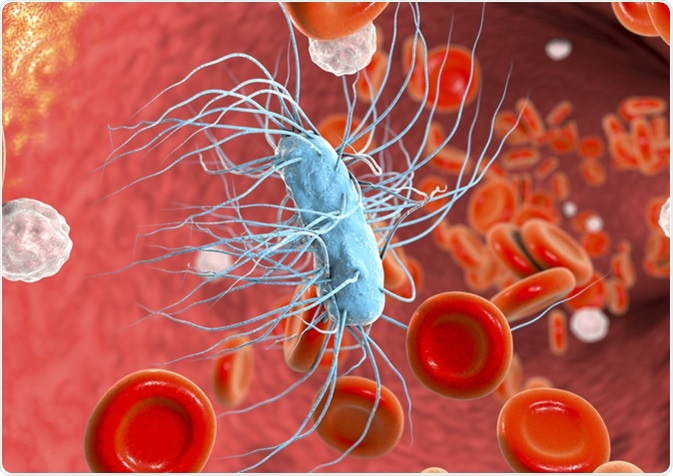Followed by a microbial infection/intoxication, if the immune system in our body starts reacting vigorously by initiating complex series of events including inflammation, organ dysfunction, hypotension, it is categorized as sepsis. According to the severity of the condition, sepsis transforms to severe sepsis and to septic shock. Around the world, one-third of the patients affected with sepsis die every year.
The actual reason behind this behavior of the immune system, which suddenly stops fighting with microbes and turns against itself, is unknown. Early identification of sepsis can alleviate the complexity of the condition, however, it is difficult to diagnose unless the patient falls into a “risk category” with signs that indicate a number of infections together.
Along with the above facts, lack of the availability of proper medications and treatment emphasizes the need for prevention and care.

Sepsis, bacteriemia, escherichia coli bacterium in blood - Kateryna Kon / Shutterstock
General Preventive Methods
1. Maintaining proper hygiene: Proper hygiene is the best preventive step for almost all infections. Washing hands with soap and water (when visibly dirty/after activities like toileting) or using sanitizer (when not visibly dirty but need to be cleaned) is important. Children should also be taught basic steps of cleanliness.
2. Taking vaccinations: Taking vaccinations will immunize our body and protect us from various viral diseases such as chicken pox, tetanus, and polio.
3. Taking good care of the wounds: As every cut in the skin can pave way for bacteria to enter the body causing infections, it is very important to clean all wounds quickly and monitor them for signs of infection. Stitches, if needed, should be done. If blisters are formed, one should not pop or break them.
4. Proper treatment of infections and other related diseases.
Bacterial infections: People who have bacterial infections are usually prescribed antibiotics. Due to the overuse/misuse of these medicines, certain bacteria become resistant to the antibiotics, making the treatment more difficult. Therefore, antibiotics should be taken only when it is necessary and one should follow the prescribed format.
Viral infections: Viral infections usually get resolved during their course without treatment. For some infections, antiviral medications are also prescribed. One should be careful when the infection does not cure and new symptoms develop, making the situation worse. In such cases, getting advice from a doctor is the better option.
Fungal and parasitic infections: Infections that are caused by fungi or parasites should be treated with specific medications to eradicate the cause.
5. Creating awareness: Creating awareness among individuals as well as families, especially for those belonging to a high-risk group, and better information about signs and symptoms of sepsis can reduce the risk of the disease and give a better understanding of when to seek help.
Specific Prevention Methods
1. For immunosuppressed: People with a weaker immune system will not be able to fight infections efficiently. Such people should be kept under careful observation so that any related symptoms can be identified as early as possible and treated properly.
Other preventive methods are:
- Following general steps of prevention like taking proper vaccination and maintaining hygiene.
- Warning such patients and their caretakers of the signs and symptoms of sepsis, and giving them needed guidelines.
- Prescribing immunosuppressive drugs.
- Giving prophylactic treatment for patients undergoing chemotherapy, who face a decrease in white blood cell count.
2. For caretakers of immunocompromised: While coming in contact with a person with low immunity, it is important to avoid the risk of spreading an infection to them or contracting one from them. The caretaker should take time for implementing precaution methods as well as maintaining proper hygiene for himself as well as the other person.
3. For elderly people: Vulnerability to urinary tract infections (UTIs) and asymptomatic bacteriuria is high in elderly people. Also, as immunity decreases with age, special care should be given to this age group to prevent sepsis in them as follows.
- Providing adequate hydration through giving regular drinks.
- Managing incontinence efficiently and employing invasive catheterization when absolutely necessary.
- Reducing the chances for bacteria to enter the bladder and cause infections by using sterile techniques.
- Early diagnosis as well as treatment of UTIs.
- Check for delirium (acute confusion).
- For people who have advanced dementia and are weak, Advanced Care Plans (ACPs) should be implemented.
4. For pregnant women: Due to the changes that happen in the immune system during pregnancy, pregnant women, as well as postpartum women, are at a higher risk (nearly 50% more than non-pregnant young adults) of contracting sepsis. Women with multiple pregnancies, especially from ethnic minorities, with a history of flu or antibiotic therapy, are the most vulnerable.
Preventive steps that should be adopted for such people are:
- Identifying the risk group and taking immediate action for diagnosis and treatment.
- Routine checking of pulse, temperature, respiratory rate, and blood pressure.
- Preventing women from getting affected by the flu during the pregnancy period.
- Encouraging them to take up flu immunizations.
Further Reading
Last Updated: Dec 29, 2022